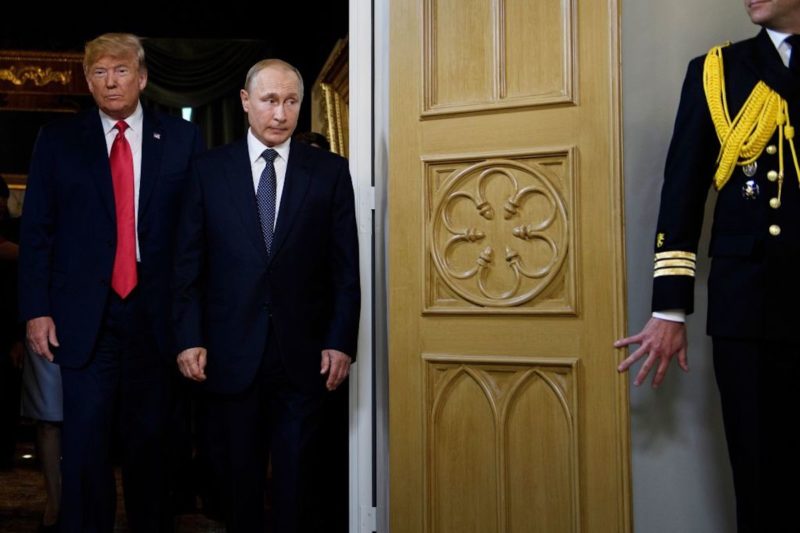The Potentially Explosive Russian Church Intrigue Revealed by Mueller Investigation
Recent moves by the deeply conservative Russian Orthodox Church, combined with acts of Russian state aggression, can only be seen as concrete efforts to undermine liberal democracy around the world.

It sounds like something from the days of the tsar: At the height of Stalin’s terror, a humble priest serving in Leningrad’s Transfiguration Cathedral, baptized an infant in secret. Many such secret baptisms occured throughout the Soviet period, but this one would turn out to be historic. The priest was Father Michael Gundyayev, whose son would become Patriarch Kirill of Moscow, the leader of the Russian Orthodox Church. The baby was Vladimir Putin.
This strange story was first told as part of the Russian state-TV documentary Patriarch and, while technically possible, seems an unlikely coincidence. The factual nature of the story is not entirely relevant, because it points to a greater truth: That the Russian Church and the Russian state have resumed their marriage.
This week the world learned that the Russian hackers implicated by the Mueller investigation didn’t just target Western governments and political parties, but also leading figures in the Orthodox Church. Top aides to Bartholomew I, the Ecumenical Patriarch of Constantinople (the “first-among-equals” head of the world’s approximately 250 million Orthodox Christians), were among those whose private correspondances may have been turned over to Russian officials.
The targeting of Orthodox Church officials may seem strange or irrelevant to a Western public unfamiliar with the politics and history of Eastern Christendom, but this revelation is neither unsurprising nor innocuous. In the Era of Putin, the Russian Orthodox Church has resumed much of its former imperial role as a servant of the State. And in a time of renewed Russian confidence and aggression abroad, the Russian Orthodox Church has become an important instrument of state power. This is a development with dangerous implications, not only for for the global Orthodox Church, but for human rights and political freedom around the world.
It appears that most of the correspondences in the recent breach were related to efforts by the Ukrainian Orthodox Church to become independent from Moscow, a decision that ultimately lies in the hands of Patriarch Bartholomew. Patriarch Kirill is seeking to prevent a split and retain his traditional control of the Kiev-based church.
The question of Ukrainian church independence has significant symbolic and practical implications for Russia’s ongoing interventions in Ukraine. It’s also an attempt by Kirill to undermine the global authority of Bartholomew, which has been a silent hope of many of the most reactionary elements of the (already deeply conservative) Orthodox world, who view him as too progressive and who favor Kirill’s more hardline stances on social and political issues.
The extent and influence of Kirill’s reactionary socio-political vision should not be underestimated. It’s a deeply anti-Western, anti-democratic, and anti-human rights worldview which has already had a significant effect on Russian domestic policy and has helped garner Russia’s recent prestige among radical conservatives around the world—particularly in the West. The “axis between Russian Orthodox and American Evangelicals,” as the Economist calls it, has been well documented, and, as Slate’s Ruth Graham points out, it’s not a coincidence that Russian spy Maria Butina sought to infiltrate American politics through the religious right.
Patriarch Kirill has described the Putin-era as a “miracle from God” and offered his powerful opposition to pro-democracy protests in Moscow in 2012. He has frequently supported government policy in sermons and on state-run television, positioning Russia in the role of spiritual defender in response to Western objections to Russian human rights policy: “We have been through an epoch of atheism, and we know what it is to live without God. We want to shout to the whole world, ‘Stop!’” His 2011 book, Freedom and Responsibility, posits a contemporary political landscape in which two antagonistic worldviews—one liberal, secular, and humanistic, the other religious and traditional—are engaged in an existential battle.
The idea of a mortal battle against the forces of secularism has found ready ears among some of the most reactionary corners of the West. The popularity of Orthodoxy among white nationalists in the United States, for example, has significant overtones of pro-Russian—and perhaps more importantly, pro-Kirill—sentiment.
But one doesn’t even need to look as far as self-proclaimed white nationalists to see the influence of Patriarch Kirill and the Russian Orthodox Church. In addition to its popularity among many mainstream American evangelicals, the Russian church has been an important pillar of Steve Bannon’s coalition of Christian traditionalists. These budding alliances, with access to the highest levels of American government and power are why the hacking revelations are concerning.
There can be little doubt that the Russian Church is now (once again) an active and potentially aggressive arm of the Russian state. The Russian state will act to protect its interests and the Church will act for the interests of the state. In fact, as can be seen in the Ukraine, these interests are often deeply intertwined.
This, in itself, would not be a problem, or of any particular interest for those outside the Orthodox Church, if not for global non-Orthodox alliances into which the Russian patriarch has led his church. These alliances, combined with acts of Russian state aggression, can only be seen as concrete efforts to undermine liberal democracy around the world. And that should be of concern to everyone.

